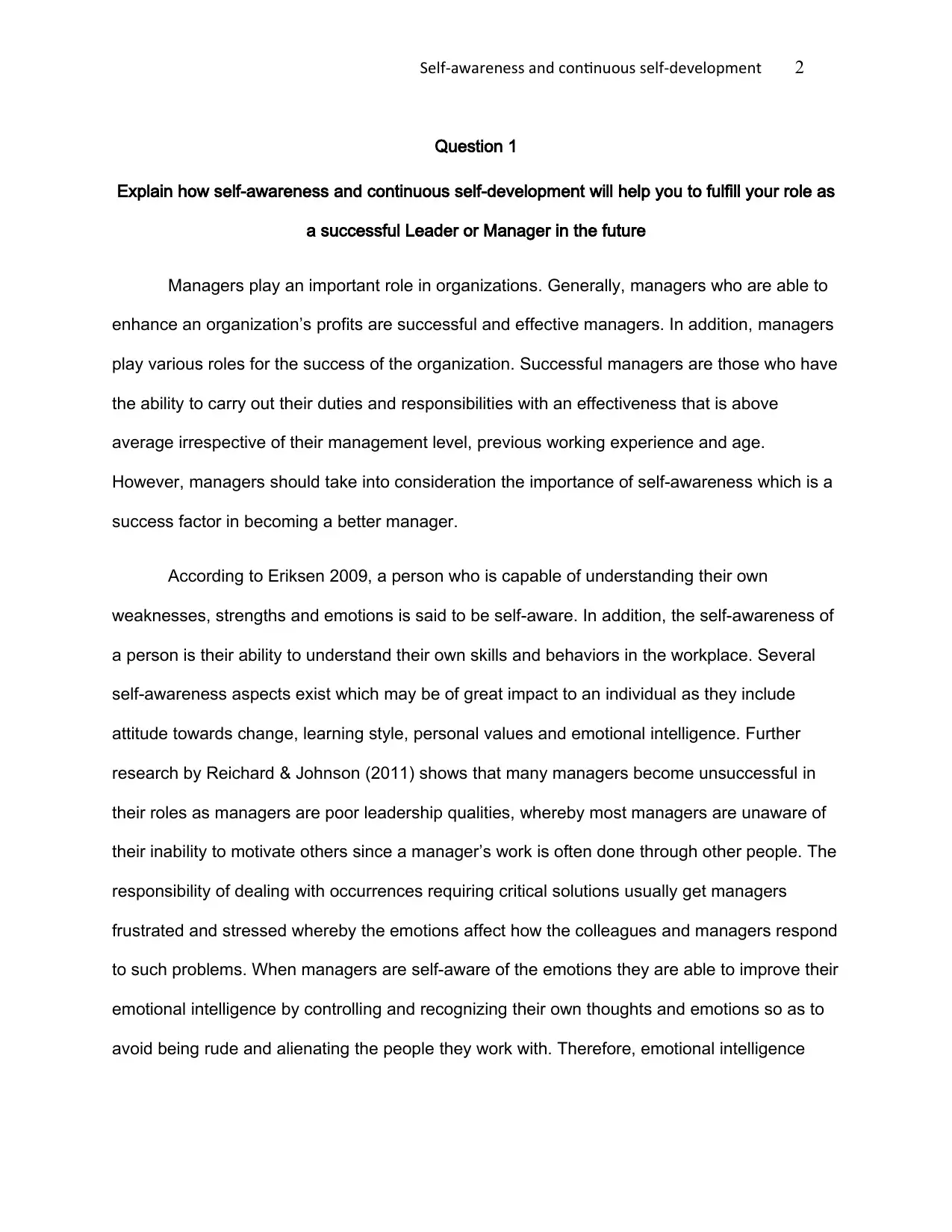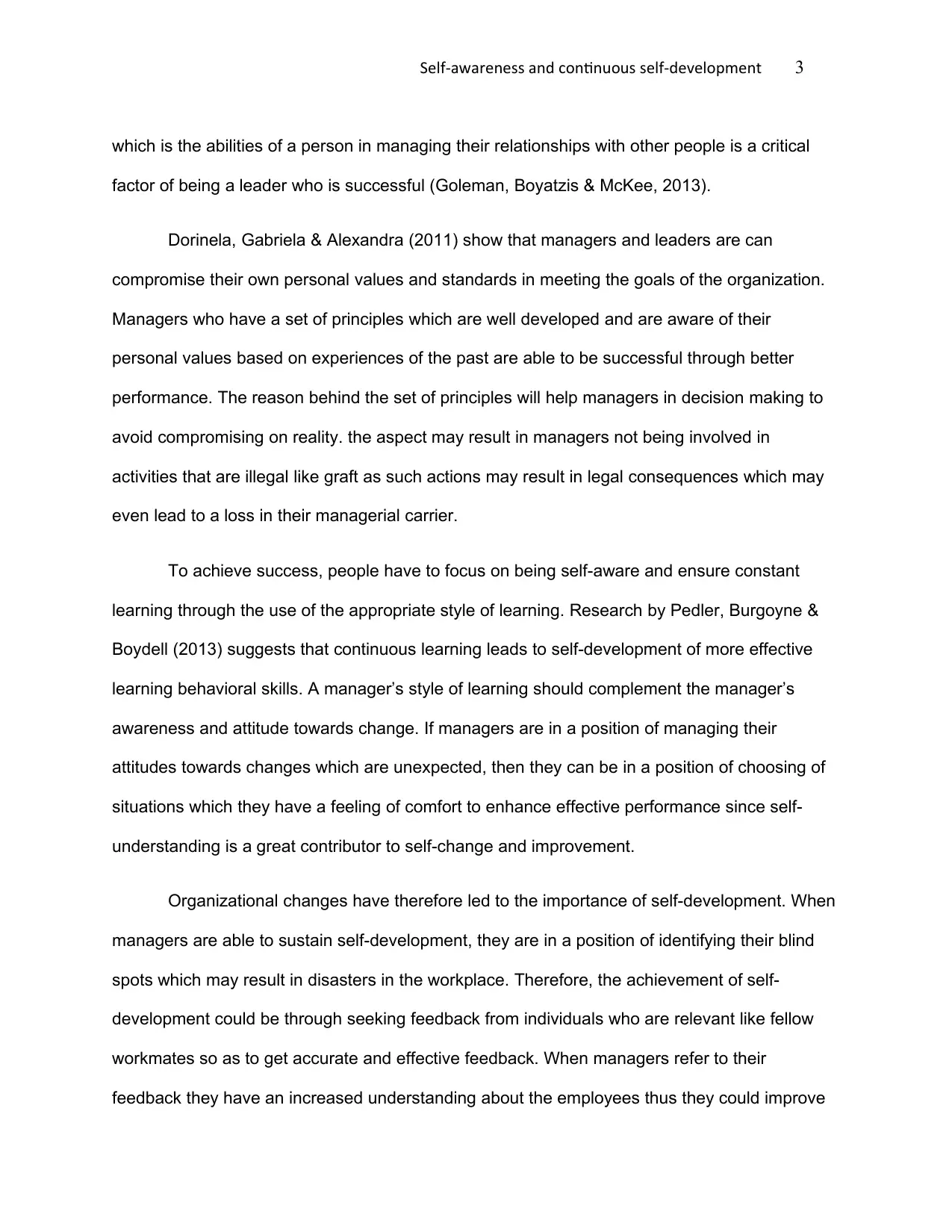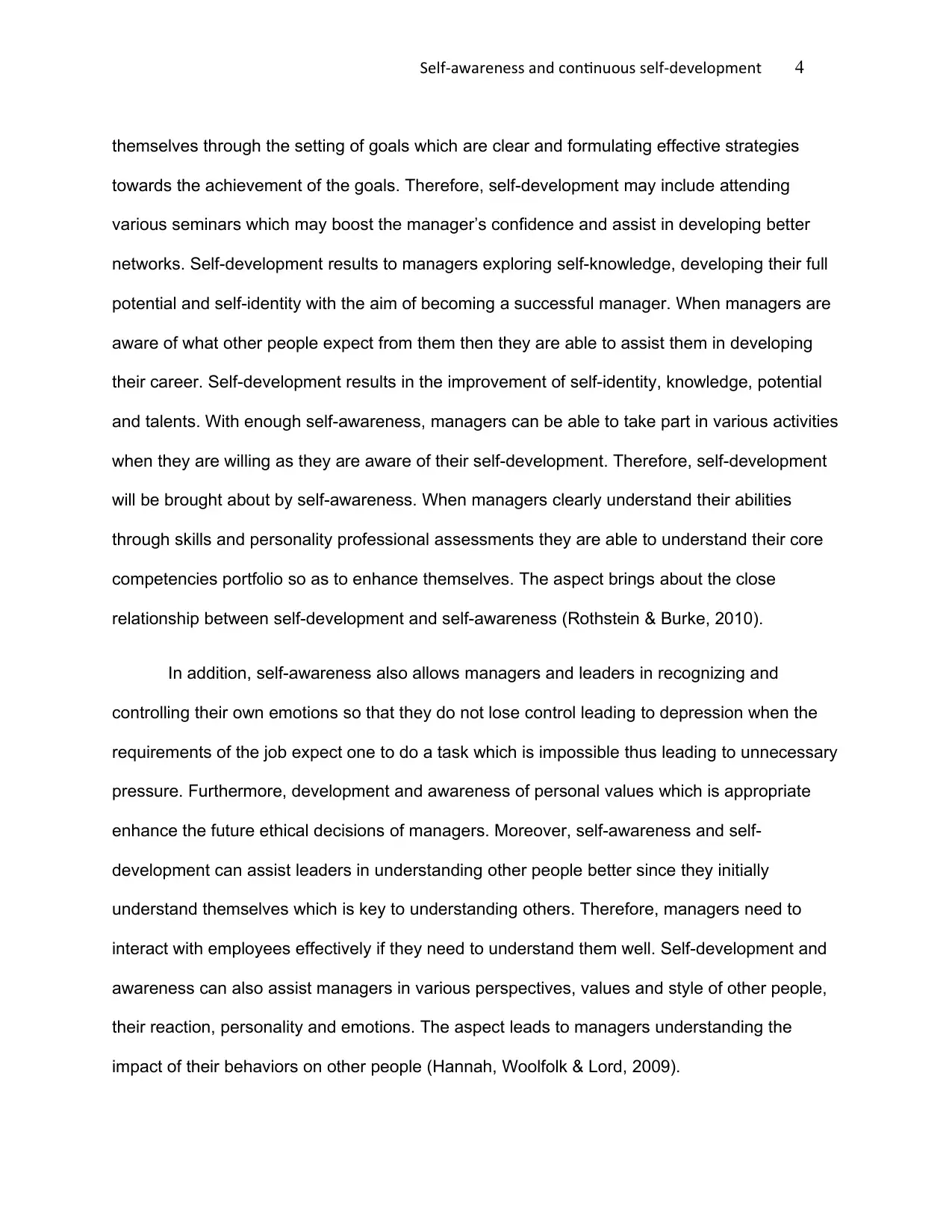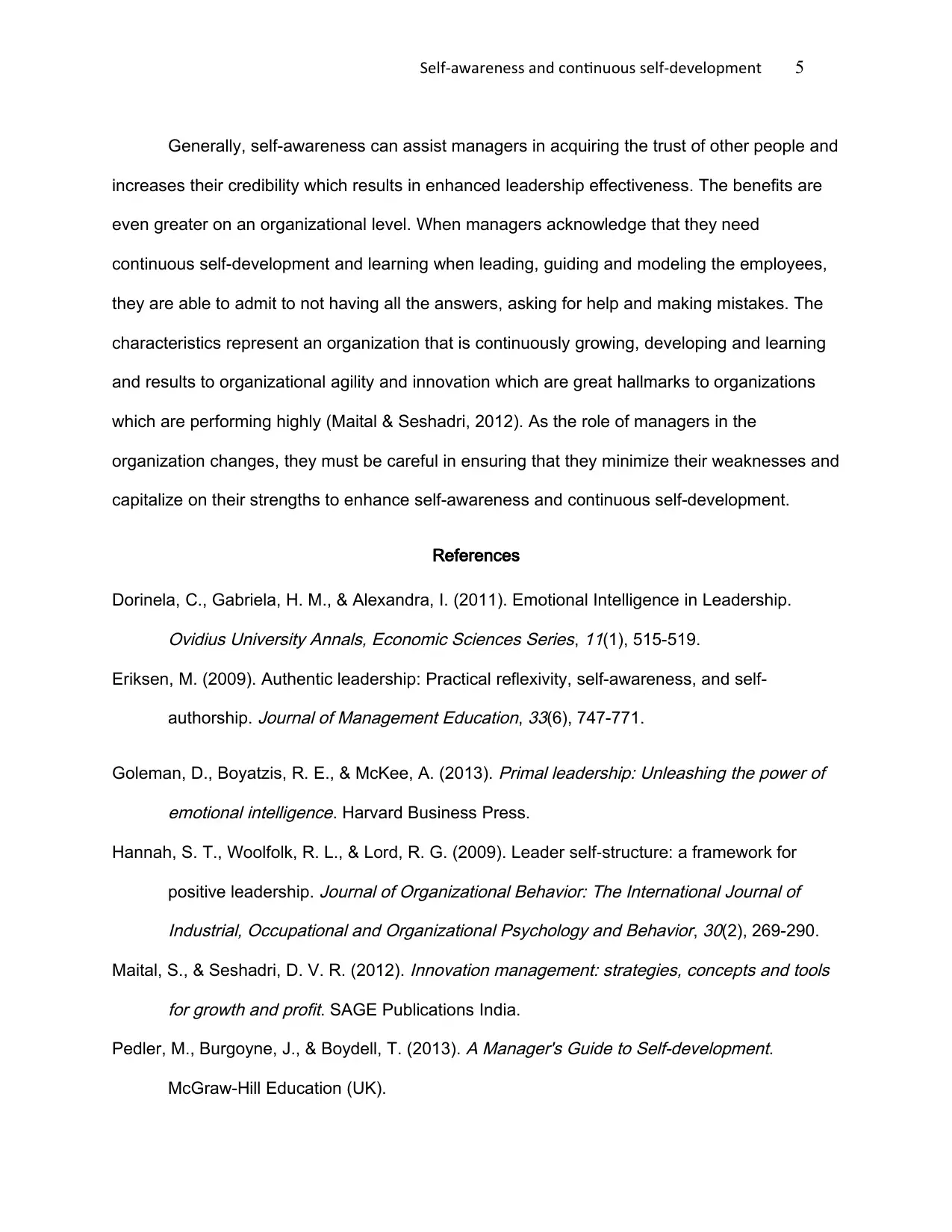Leadership & Management: Self-Awareness and Development's Impact
VerifiedAdded on 2023/06/04
|6
|1464
|105
Essay
AI Summary
This essay discusses the significance of self-awareness and continuous self-development for aspiring leaders and managers. It emphasizes that self-awareness, encompassing an understanding of one's strengths, weaknesses, emotions, and personal values, is crucial for effective leadership. The essay highlights the importance of emotional intelligence, ethical decision-making, and continuous learning in achieving managerial success. It also explores how self-awareness enables managers to understand and empathize with their employees, build trust, and foster a culture of continuous growth and innovation within the organization. The document includes a critical incident analysis reflecting on Belbin's self-analysis toolkit and identifying areas for personal development to enhance leadership capabilities, referencing various academic journals and research to support its arguments.

Self-awareness and continuous self-development 1
Name
Student ID
Institutional Affiliation
Name
Student ID
Institutional Affiliation
Paraphrase This Document
Need a fresh take? Get an instant paraphrase of this document with our AI Paraphraser

Self-awareness and continuous self-development 2
Question 1
Explain how self-awareness and continuous self-development will help you to fulfill your role as
a successful Leader or Manager in the future
Managers play an important role in organizations. Generally, managers who are able to
enhance an organization’s profits are successful and effective managers. In addition, managers
play various roles for the success of the organization. Successful managers are those who have
the ability to carry out their duties and responsibilities with an effectiveness that is above
average irrespective of their management level, previous working experience and age.
However, managers should take into consideration the importance of self-awareness which is a
success factor in becoming a better manager.
According to Eriksen 2009, a person who is capable of understanding their own
weaknesses, strengths and emotions is said to be self-aware. In addition, the self-awareness of
a person is their ability to understand their own skills and behaviors in the workplace. Several
self-awareness aspects exist which may be of great impact to an individual as they include
attitude towards change, learning style, personal values and emotional intelligence. Further
research by Reichard & Johnson (2011) shows that many managers become unsuccessful in
their roles as managers are poor leadership qualities, whereby most managers are unaware of
their inability to motivate others since a manager’s work is often done through other people. The
responsibility of dealing with occurrences requiring critical solutions usually get managers
frustrated and stressed whereby the emotions affect how the colleagues and managers respond
to such problems. When managers are self-aware of the emotions they are able to improve their
emotional intelligence by controlling and recognizing their own thoughts and emotions so as to
avoid being rude and alienating the people they work with. Therefore, emotional intelligence
Question 1
Explain how self-awareness and continuous self-development will help you to fulfill your role as
a successful Leader or Manager in the future
Managers play an important role in organizations. Generally, managers who are able to
enhance an organization’s profits are successful and effective managers. In addition, managers
play various roles for the success of the organization. Successful managers are those who have
the ability to carry out their duties and responsibilities with an effectiveness that is above
average irrespective of their management level, previous working experience and age.
However, managers should take into consideration the importance of self-awareness which is a
success factor in becoming a better manager.
According to Eriksen 2009, a person who is capable of understanding their own
weaknesses, strengths and emotions is said to be self-aware. In addition, the self-awareness of
a person is their ability to understand their own skills and behaviors in the workplace. Several
self-awareness aspects exist which may be of great impact to an individual as they include
attitude towards change, learning style, personal values and emotional intelligence. Further
research by Reichard & Johnson (2011) shows that many managers become unsuccessful in
their roles as managers are poor leadership qualities, whereby most managers are unaware of
their inability to motivate others since a manager’s work is often done through other people. The
responsibility of dealing with occurrences requiring critical solutions usually get managers
frustrated and stressed whereby the emotions affect how the colleagues and managers respond
to such problems. When managers are self-aware of the emotions they are able to improve their
emotional intelligence by controlling and recognizing their own thoughts and emotions so as to
avoid being rude and alienating the people they work with. Therefore, emotional intelligence

Self-awareness and continuous self-development 3
which is the abilities of a person in managing their relationships with other people is a critical
factor of being a leader who is successful (Goleman, Boyatzis & McKee, 2013).
Dorinela, Gabriela & Alexandra (2011) show that managers and leaders are can
compromise their own personal values and standards in meeting the goals of the organization.
Managers who have a set of principles which are well developed and are aware of their
personal values based on experiences of the past are able to be successful through better
performance. The reason behind the set of principles will help managers in decision making to
avoid compromising on reality. the aspect may result in managers not being involved in
activities that are illegal like graft as such actions may result in legal consequences which may
even lead to a loss in their managerial carrier.
To achieve success, people have to focus on being self-aware and ensure constant
learning through the use of the appropriate style of learning. Research by Pedler, Burgoyne &
Boydell (2013) suggests that continuous learning leads to self-development of more effective
learning behavioral skills. A manager’s style of learning should complement the manager’s
awareness and attitude towards change. If managers are in a position of managing their
attitudes towards changes which are unexpected, then they can be in a position of choosing of
situations which they have a feeling of comfort to enhance effective performance since self-
understanding is a great contributor to self-change and improvement.
Organizational changes have therefore led to the importance of self-development. When
managers are able to sustain self-development, they are in a position of identifying their blind
spots which may result in disasters in the workplace. Therefore, the achievement of self-
development could be through seeking feedback from individuals who are relevant like fellow
workmates so as to get accurate and effective feedback. When managers refer to their
feedback they have an increased understanding about the employees thus they could improve
which is the abilities of a person in managing their relationships with other people is a critical
factor of being a leader who is successful (Goleman, Boyatzis & McKee, 2013).
Dorinela, Gabriela & Alexandra (2011) show that managers and leaders are can
compromise their own personal values and standards in meeting the goals of the organization.
Managers who have a set of principles which are well developed and are aware of their
personal values based on experiences of the past are able to be successful through better
performance. The reason behind the set of principles will help managers in decision making to
avoid compromising on reality. the aspect may result in managers not being involved in
activities that are illegal like graft as such actions may result in legal consequences which may
even lead to a loss in their managerial carrier.
To achieve success, people have to focus on being self-aware and ensure constant
learning through the use of the appropriate style of learning. Research by Pedler, Burgoyne &
Boydell (2013) suggests that continuous learning leads to self-development of more effective
learning behavioral skills. A manager’s style of learning should complement the manager’s
awareness and attitude towards change. If managers are in a position of managing their
attitudes towards changes which are unexpected, then they can be in a position of choosing of
situations which they have a feeling of comfort to enhance effective performance since self-
understanding is a great contributor to self-change and improvement.
Organizational changes have therefore led to the importance of self-development. When
managers are able to sustain self-development, they are in a position of identifying their blind
spots which may result in disasters in the workplace. Therefore, the achievement of self-
development could be through seeking feedback from individuals who are relevant like fellow
workmates so as to get accurate and effective feedback. When managers refer to their
feedback they have an increased understanding about the employees thus they could improve
⊘ This is a preview!⊘
Do you want full access?
Subscribe today to unlock all pages.

Trusted by 1+ million students worldwide

Self-awareness and continuous self-development 4
themselves through the setting of goals which are clear and formulating effective strategies
towards the achievement of the goals. Therefore, self-development may include attending
various seminars which may boost the manager’s confidence and assist in developing better
networks. Self-development results to managers exploring self-knowledge, developing their full
potential and self-identity with the aim of becoming a successful manager. When managers are
aware of what other people expect from them then they are able to assist them in developing
their career. Self-development results in the improvement of self-identity, knowledge, potential
and talents. With enough self-awareness, managers can be able to take part in various activities
when they are willing as they are aware of their self-development. Therefore, self-development
will be brought about by self-awareness. When managers clearly understand their abilities
through skills and personality professional assessments they are able to understand their core
competencies portfolio so as to enhance themselves. The aspect brings about the close
relationship between self-development and self-awareness (Rothstein & Burke, 2010).
In addition, self-awareness also allows managers and leaders in recognizing and
controlling their own emotions so that they do not lose control leading to depression when the
requirements of the job expect one to do a task which is impossible thus leading to unnecessary
pressure. Furthermore, development and awareness of personal values which is appropriate
enhance the future ethical decisions of managers. Moreover, self-awareness and self-
development can assist leaders in understanding other people better since they initially
understand themselves which is key to understanding others. Therefore, managers need to
interact with employees effectively if they need to understand them well. Self-development and
awareness can also assist managers in various perspectives, values and style of other people,
their reaction, personality and emotions. The aspect leads to managers understanding the
impact of their behaviors on other people (Hannah, Woolfolk & Lord, 2009).
themselves through the setting of goals which are clear and formulating effective strategies
towards the achievement of the goals. Therefore, self-development may include attending
various seminars which may boost the manager’s confidence and assist in developing better
networks. Self-development results to managers exploring self-knowledge, developing their full
potential and self-identity with the aim of becoming a successful manager. When managers are
aware of what other people expect from them then they are able to assist them in developing
their career. Self-development results in the improvement of self-identity, knowledge, potential
and talents. With enough self-awareness, managers can be able to take part in various activities
when they are willing as they are aware of their self-development. Therefore, self-development
will be brought about by self-awareness. When managers clearly understand their abilities
through skills and personality professional assessments they are able to understand their core
competencies portfolio so as to enhance themselves. The aspect brings about the close
relationship between self-development and self-awareness (Rothstein & Burke, 2010).
In addition, self-awareness also allows managers and leaders in recognizing and
controlling their own emotions so that they do not lose control leading to depression when the
requirements of the job expect one to do a task which is impossible thus leading to unnecessary
pressure. Furthermore, development and awareness of personal values which is appropriate
enhance the future ethical decisions of managers. Moreover, self-awareness and self-
development can assist leaders in understanding other people better since they initially
understand themselves which is key to understanding others. Therefore, managers need to
interact with employees effectively if they need to understand them well. Self-development and
awareness can also assist managers in various perspectives, values and style of other people,
their reaction, personality and emotions. The aspect leads to managers understanding the
impact of their behaviors on other people (Hannah, Woolfolk & Lord, 2009).
Paraphrase This Document
Need a fresh take? Get an instant paraphrase of this document with our AI Paraphraser

Self-awareness and continuous self-development 5
Generally, self-awareness can assist managers in acquiring the trust of other people and
increases their credibility which results in enhanced leadership effectiveness. The benefits are
even greater on an organizational level. When managers acknowledge that they need
continuous self-development and learning when leading, guiding and modeling the employees,
they are able to admit to not having all the answers, asking for help and making mistakes. The
characteristics represent an organization that is continuously growing, developing and learning
and results to organizational agility and innovation which are great hallmarks to organizations
which are performing highly (Maital & Seshadri, 2012). As the role of managers in the
organization changes, they must be careful in ensuring that they minimize their weaknesses and
capitalize on their strengths to enhance self-awareness and continuous self-development.
References
Dorinela, C., Gabriela, H. M., & Alexandra, I. (2011). Emotional Intelligence in Leadership.Ovidius University Annals, Economic Sciences Series,
11(1), 515-519.
Eriksen, M. (2009). Authentic leadership: Practical reflexivity, self-awareness, and self-
authorship.
Journal of Management Education,
33(6), 747-771.
Goleman, D., Boyatzis, R. E., & McKee, A. (2013).
Primal leadership: Unleashing the power of
emotional intelligence. Harvard Business Press.
Hannah, S. T., Woolfolk, R. L., & Lord, R. G. (2009). Leader self‐structure: a framework for
positive leadership.
Journal of Organizational Behavior: The International Journal of
Industrial, Occupational and Organizational Psychology and Behavior,
30(2), 269-290.
Maital, S., & Seshadri, D. V. R. (2012).
Innovation management: strategies, concepts and tools
for growth and profit. SAGE Publications India.
Pedler, M., Burgoyne, J., & Boydell, T. (2013).
A Manager's Guide to Self-development.
McGraw-Hill Education (UK).
Generally, self-awareness can assist managers in acquiring the trust of other people and
increases their credibility which results in enhanced leadership effectiveness. The benefits are
even greater on an organizational level. When managers acknowledge that they need
continuous self-development and learning when leading, guiding and modeling the employees,
they are able to admit to not having all the answers, asking for help and making mistakes. The
characteristics represent an organization that is continuously growing, developing and learning
and results to organizational agility and innovation which are great hallmarks to organizations
which are performing highly (Maital & Seshadri, 2012). As the role of managers in the
organization changes, they must be careful in ensuring that they minimize their weaknesses and
capitalize on their strengths to enhance self-awareness and continuous self-development.
References
Dorinela, C., Gabriela, H. M., & Alexandra, I. (2011). Emotional Intelligence in Leadership.Ovidius University Annals, Economic Sciences Series,
11(1), 515-519.
Eriksen, M. (2009). Authentic leadership: Practical reflexivity, self-awareness, and self-
authorship.
Journal of Management Education,
33(6), 747-771.
Goleman, D., Boyatzis, R. E., & McKee, A. (2013).
Primal leadership: Unleashing the power of
emotional intelligence. Harvard Business Press.
Hannah, S. T., Woolfolk, R. L., & Lord, R. G. (2009). Leader self‐structure: a framework for
positive leadership.
Journal of Organizational Behavior: The International Journal of
Industrial, Occupational and Organizational Psychology and Behavior,
30(2), 269-290.
Maital, S., & Seshadri, D. V. R. (2012).
Innovation management: strategies, concepts and tools
for growth and profit. SAGE Publications India.
Pedler, M., Burgoyne, J., & Boydell, T. (2013).
A Manager's Guide to Self-development.
McGraw-Hill Education (UK).

Self-awareness and continuous self-development 6
Reichard, R. J., & Johnson, S. K. (2011). Leader self-development as an organizational
strategy.
The Leadership Quarterly,
22(1), 33-42.
Rothstein, M. G., & Burke, R. J. (Eds.). (2010).
Self-management and leadership development.
Edward Elgar Publishing.
Reichard, R. J., & Johnson, S. K. (2011). Leader self-development as an organizational
strategy.
The Leadership Quarterly,
22(1), 33-42.
Rothstein, M. G., & Burke, R. J. (Eds.). (2010).
Self-management and leadership development.
Edward Elgar Publishing.
⊘ This is a preview!⊘
Do you want full access?
Subscribe today to unlock all pages.

Trusted by 1+ million students worldwide
1 out of 6
Related Documents
Your All-in-One AI-Powered Toolkit for Academic Success.
+13062052269
info@desklib.com
Available 24*7 on WhatsApp / Email
![[object Object]](/_next/static/media/star-bottom.7253800d.svg)
Unlock your academic potential
Copyright © 2020–2026 A2Z Services. All Rights Reserved. Developed and managed by ZUCOL.





